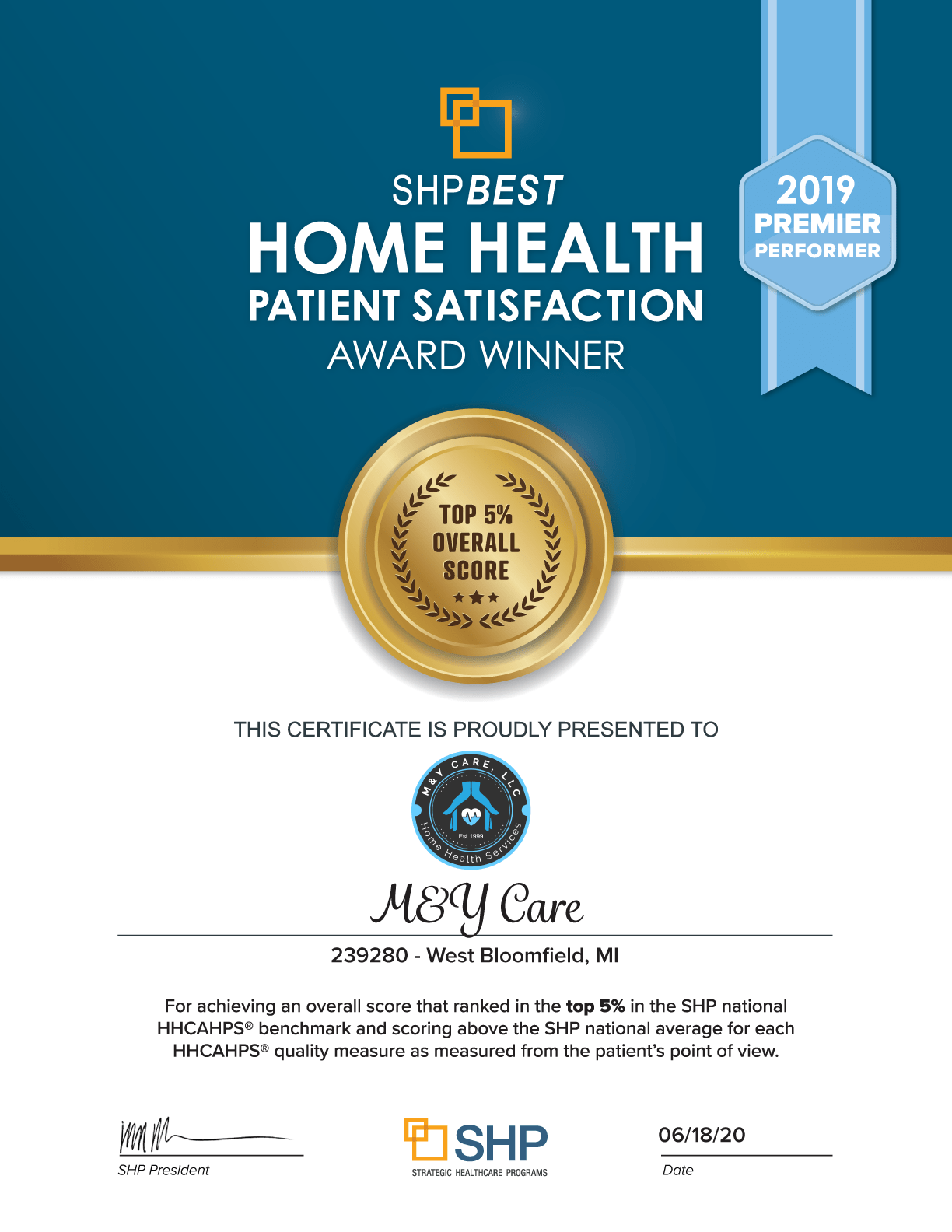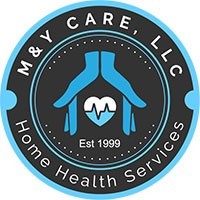M&Y Care has earned the 2019 SHPBestTM “Premier Performer” Patient Satisfaction Award
M&Y Care has been recognized by Strategic Healthcare Programs (SHP) as a “Premier Performer” for achieving an overall patient satisfaction score that ranked in the top 5% of all eligible SHP clients for the 2019 calendar year.
The annual SHPBest™ award program was created to acknowledge home health agencies that consistently provide high quality service to their patients. The 2019 award recipients were determined by reviewing and ranking the overall satisfaction score for more than 3,000 home health providers. With the largest HHCAHPS benchmark in the nation, SHP is in a unique position to identify and recognize organizations that have made patient satisfaction a priority and have been rewarded for their efforts with high marks on the HHCAHPS survey.
“SHP is proud to present the SHPBest awards to our top-performing customers. We commend these organizations for their continuous focus on delivering the highest quality of care to their patients”, said Rob Paulsson, President of SHP.


Frequently Asked Questions on Home Health Care Agency
Q: What qualities do I need to become a home health aide?
Because of their responsibilities and autonomy, home health aides can be an excellent choice for people who want to find flexible, part-time work . However, they should also enjoy working with patients and understand how difficult this line of work can be.
If you’re interested in becoming a home health aide, you’ll need at least a high school diploma or GED . You’ll also need some training and experience before you can qualify for certain positions .
Once you become certified , it’s easy to move between jobs if one facility doesn’t suit your needs or interests. This allows you to make more money as your career progresses.
Employers usually prefer home health aides who have experience in caregiving, rehabilitating, or nursing . This may be the result of on-the-job training or because facilities want people with relevant degrees.
But it can also be because they believe workers who already possess these skills are more likely to excel in their position. Even if you don’t currently have these qualifications , you can look for jobs at places that offer this type of paid training .
This way, you’ll receive hands-on experience working with patients without wasting time and money completing an entire degree program . If you’re planning to work at a care facility that doesn’t offer paid training programs, check whether they’ll still hire you as an aide without training.
When it comes to the job interview, you may be asked why you want to become a home health aide and how long you plan to stay in this line of work . Some facilities might only hire people who are looking for full-time jobs.
However, most home health care workers are casual employees working on a per diem basis or through staffing agencies . This is because they usually provide intermittent services.
Q: What qualifications do you need to be a Care Worker?
There is no one-size-fits-all answer to this question, as the qualifications necessary to work in home care or home health care can vary depending on the specific position and on the state in which you reside.
However, many home health aides and caregivers have only a high school diploma or GED, while some positions may require an associate’s degree or higher.
Some states also require certification in CPR and first aid. Many home health aides and caregivers are also certified in infection control techniques. It’s also important to be familiar with the specific type of care that you will be providing, whether it is skilled nursing services, physical therapy, or hospice care. So it’s best to check with your state’s regulations for healthcare providers to understand the full scope of qualifications required.
Q: How much is home care per hour in Unites States?
The median hourly rate of home care in the United States is $21, according to a report from Home Instead Senior Care. However, the cost of home care can vary depending on the city or state you live in, as well as the type of care you require. For example, home health care can be more expensive than basic companionship and housekeeping services.
Caregivers working for a home health provider typically earn more than those who provide home care privately. In addition, nurses who provide home health care may earn more than caregivers who do not have a nursing degree. As with most things in life, it pays to shop around and compare rates before you choose a caregiver or provider.
Q: How much do Home Health Aides make per hour?
The average hourly rate of home health aides is $10.50, according to the Bureau of Labor Statistics (BLS). However, this varies depending on your experience and your state. The median hourly wage for home health aides in the United States as a whole is $10.76.
Home care providers also see significant variation in pay rates based on specific cities and states where they operate. For example, the top-paying locations are Hawaii ($11.94), Alaska ($12), Massachusetts ($12) and Connecticut ($12). The lowest paying states are New Mexico ($8), Arkansas ($8.75), Mississippi ($9) and West Virginia ($9).
Q: What does a home health aide do?
A home health aide (HHA) typically supports patients who require some degree of medical attention in their homes, providing everything from personal care and housekeeping services to skilled nursing. The overall goal is to help the patient remain safely at home by reducing the amount of work or assistance they need.
Home health aides are usually supervised by licensed practical nurses or registered nurses, depending on their specific job duties. They may also coordinate with doctors, social workers, physical therapists and other healthcare professionals as necessary for each individual patient’s situation.
For example, an HHA might provide basic personal care like bathing and meal preparation for a patient unable to perform these functions on his or her own due to illness or injury .
They can also take vital signs, help with paperwork and help the patient get to doctor’s appointments when necessary. In some cases, a home health aide may also be able to administer medication or check a patient’s incision site after surgery.
Generally speaking, the more skilled services you require in your home care arrangement, the higher salary range you can expect for your caregiver. For example, a registered nurse is going to have a much wider spectrum of skills and certifications than an entry-level HHA who might only have CPR training . The same would apply for an occupational therapist compared to a basic house cleaner.
Q: What does a Caregiver do?
A caregiver can provide many different types of support depending their skills, location and licensing. Since there is not a single job title for this type of work, it’s helpful to break down the different roles into similar positions.
Caregivers include:
- Personal Care Aide
- Certified Nursing Assistant (CNA)
- Licensed Practical Nurse / Licensed Vocational Nurse (LPN/LVN)
- Home Health Aide
- Care Manager
- Medical Social Worker
- Occupational Therapist
- Geriatric Care Manager
Personal care aides typically help with personal care, meal preparation and housekeeping. CNAs also might provide some basic medical services if permitted by state law .
Home health aides complete less complicated tasks like grocery shopping, transportation to doctors’ appointments and cleaning the house . can also assist with more personal care tasks like bathing and grooming.
Highly skilled home care workers might be certified nursing assistants (CNAs), licensed practical nurses (LPNs) or registered nurses (RNs). They can handle more complicated medical procedures than less-skilled providers, which can mean higher pay rates.
For example, an LPN who has completed additional training in intravenous therapy may earn $2 to $3 more per hour than a standard CNA. The same principle applies for RNs who have the training and experience to work as nurse practitioners .
